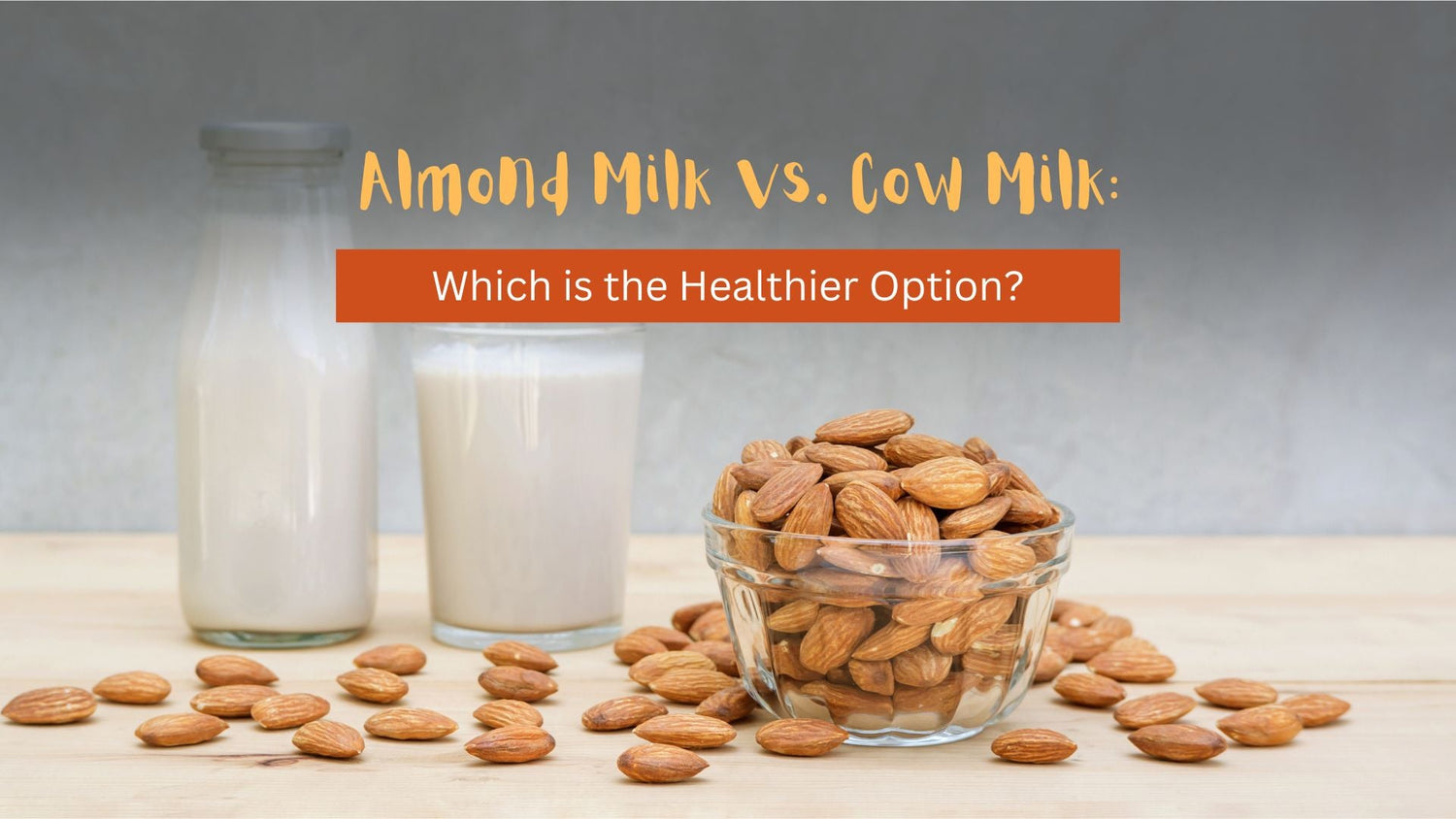
Almond milk has become a very popular plant-based substitute for cow's milk, especially among people who are vegan, lactose intolerant, or health-conscious. Understanding the nutritional differences between cow's and almond milk is essential as customers switch toward more feasible and wholesome options. Both have remarkable benefits, but the effects on health can vary depending on dietary requirements. To help customers choose the options that fit their lifestyle and wellness objectives, this comparison will assess the nutritional profiles, including vitamins, minerals, calories, protein content, and potential health benefits.
Nutritional Comparison
A. Caloric Content
Almond milk has significantly fewer calories than cow milk when compared to the latter. Unsweetened almond milk is a popular option for people wanting to cut calories because a typical cup has about 40 calories. In comparison, because of its higher fat content, a cup of whole cow milk has about 122 calories. For those on calorie-restricted diets or seeking to control their weight, this difference makes almond milk a better choice. The number of calories, however, can vary depending on whether the almond milk is flavored or sweetened.
B. Protein Content
Cow's milk and almond milk have quite different protein content. Compared to cow milk, almond milk usually contains only about 1 gram of protein per cup. However, with about 8 grams per cup, cow's milk is a source of high-quality protein. This protein in cow's milk is a complete protein source because it contains all nine essential amino acids. Cow milk is a better option for people who need more protein, like athletes or people trying to gain muscle. On the other hand, fortified almond milk types might provide more protein due to the added ingredients.
Shop Related Products
C. Fat and Carbohydrate Levels
Almond milk is excellent for individuals following low-fat or low-carb diets because it is low in fat and carbohydrates. There are approximately 3.4 grams of carbohydrates and 2.5 grams of fat in one cup of unsweetened almond milk. The fat content of cow's milk, on the other hand, differs based on the type (whole, 2%, or skim); a cup of whole milk has about 8 grams of fat. Moreover, cow milk contains more carbohydrates—about 12 grams per cup—mostly from lactose, a naturally produced milk sugar. Almond milk is a healthy alternative for people worried about their fat intake or carbohydrates.
D. Vitamins and Minerals
Frequently fortified with nutrients like calcium, vitamin D, and vitamin E, almond milk offers comparable advantages to cow's milk, particularly for individuals who avoid dairy. Vitamin E is an antioxidant, supporting skin health, while calcium and vitamin D support bone health. However, each brand may have different levels of fortification. Cow milk, on the other hand, is generally high in riboflavin, calcium, vitamin B12, and other vital nutrients. While riboflavin and vitamin B12 help in the production of energy and sustain the nervous system, calcium strengthens bones and teeth. Therefore, cow's milk gives these nutrients in their unadulterated, natural form.
Benefits of Almond Milk
Low in Calories and Saturated Fat
Almond milk has many health advantages, especially for people looking for a heart-healthy and low-calorie alternative to cow's milk. It is an excellent pick for people trying to regulate their weight or curtail calories because each cup only includes about 40 calories. In addition to being low in saturated fat, almond milk helps to maintain healthy cholesterol levels, which helps heart health. It is also naturally lactose-free, which makes it a better choice for people who are allergic to milk products or have lactose intolerance. Almond milk can support bone health and well-being when nourished with calcium and vitamin D.
Heart-Healthy
Almond milk's low saturated fat content and cholesterol-free status make it heart-healthy. Almond milk has healthy fats, mainly unsaturated fats, which could help lower bad cholesterol (LDL) and enhance cardiovascular health, compared to cow milk, which can increase saturated fat levels. A powerful antioxidant, vitamin E also encourages heart health by safeguarding the body from inflammation and oxidative stress. Almond milk is also a good choice for people who want to control their weight because it contains a few calories, which helps prevent excessive fat concentration and enhances heart health.
Lactose-Free
Being naturally lactose-free is one of almond milk's great benefits, which makes it the best option for people who are lactose intolerant or allergic to dairy products. Many people have difficulty digesting lactose, a sugar in cow's milk, which can lead to discomforts like gas, bloating, and diarrohea. Almond milk is a plant-based replacement that has a mild flavour and creamy consistency without the gastrointestinal disorders linked to lactose. Furthermore, when supplemented, almond milk can provide vital nutrients and is easy on the stomach for those on vegan, vegetarian, or dairy-free diets.
Cons of Almond Milk
Although almond milk offers numerous advantages, it also has certain disadvantages. A setback is its low protein content, which is only about 1 gram per cup—much less than cow milk, which has about 8 grams. For people who rely on milk as a source of protein, this may make it less acceptable. Furthermore, the added sugars, preservatives, and artificial flavourings found in almond milk reduce the health benefits of the product. It's also crucial to note that, unless infused, almond milk may not always contain as many of the essential vitamins naturally available in cow's milk. The use of water in the production of almonds can also have a considerable negative effect on the environment.
Benefits of Cow Milk
High in Protein
Cow milk has many health advantages, especially its high protein content. A cup of cow's milk contains approximately 8 grams of complete, high-quality protein, which includes all nine essential amino acids needed for immune system function, muscle repair, and general body growth. For athletes, children, and anybody looking to fulfil their protein needs, it is a great option. Cow milk is a nutrient-dense preference for daily nutrition because it is high in protein and other key nutrients like calcium, vitamin B12, and riboflavin, which support healthy bones, energy production, and general well-being.
Rich Source of Calcium
Cow's milk has plentiful calcium which supports bone health and teeth. It is essential to sustaining bone density and preventing diseases like osteoporosis, and one cup of cow milk supplies around 30% of the daily recommended intake. Additionally, calcium is essential for blood coagulation, nerve transmission, and muscle function. Calcium in cow's milk helps children, teenagers, and older adults develop and maintain healthy bones. Furthermore, fortified cow milk is a fantastic option for promoting general skeletal health because the vitamin D it contains improves the absorption of nutrients.
Contains All Nine Essential Amino Acids
All nine essential amino acids, which the body is unable to produce on its own, are present in cow milk, making it a complete protein source. These amino acids are essential for many processes, such as hormone and enzyme synthesis, muscle growth, and tissue repair. Cow milk's protein aids in muscle growth and repair, which makes it advantageous for athletes and people who exercise. These amino acids are also necessary for preserving the skin's health, immune system, and other body processes. Cow milk provides a convenient way to meet daily amino acid requirements for general health because it is a natural, high-quality protein.
Cons of Cow Milk
Although nutrient-dense, cow milk has a lot of drawbacks. Because it contains lactose, people who are lactose intolerant may feel distress, gas, and bloating. Allergic reactions can occur in some people due to their allergies to dairy proteins like casein and whey. Cow milk has a lot of saturated fats, especially whole milk, which, if consumed in excess, can raise cholesterol and increase the risk of heart disease. Dairy farming's high water consumption and greenhouse gas emissions are among the environmental problems that make it less efficient. Animal welfare-related legitimate values make it even less appealing.
Dietary Considerations
Almond milk is an ideal substitute for cow's milk for people suffering from dairy allergies or lactose intolerance. Dairy allergies are immunological responses to milk proteins, whereas lactose intolerance is difficulty digesting lactose. Almond milk is a safe and appealing alternative because it is naturally lactose and dairy-free. The nutritional requirements of various age groups differ. Adults and older children may choose almond milk to cut calories or avoid dairy, but infants and toddlers need the vital fats, proteins, and vitamins in cow's milk for growth. Essential nutrients like calcium and vitamin D for strong bones and teeth are found in fortified almond milk.
Conclusion
Cow and almond milk differ in several ways, including nutritional richness, protein content, and calorie value. Almond milk is the best choice for people searching for a light, lactose-free substitute because it has fewer calories, fat, and protein. However, cow's milk is rich in protein, calcium, and vital vitamins like vitamin B12. Depending on personal needs, one can choose between the healthier options. Cow milk promotes higher protein and calcium intake, while almond milk is best for people with lactose intolerance, dairy allergies, or plant-based diets. The choice between the two is influenced by ethical implications such as animal welfare and environmental impact.
Frequently Asked Questions
Q1. Which is better, almond or cow milk?
The reason almond milk has fewer calories than cow and soy milk is that it includes very little protein and carbs when left unsweetened. Small amounts of heart-healthy unsaturated fat and vitamin E are also found in almond milk; some variants are fortified with calcium and vitamin D as well.
Is almond milk healthier than cow milk?
Although there is more protein in cow's milk, it is insufficient to significantly alter your diet, and the fat and salt content are nearly the same. However, because almond milk is rich in vitamin D, which cow's milk is not, it is comparatively healthier and useful for those who are lactose intolerant.
Is it good to drink almond milk daily?
Most children can easily consume almond milk on a daily basis, especially if it is fortified with vitamins and minerals. One should be conscious of added sugars, though.
Why is almond milk more expensive than cow milk?
The cost of producing plant-based milk is presently higher than that of conventional milk. This is because the demand for plant-based milk is still relatively low when compared to dairy milk.
Why do people prefer almond milk?
Almond milk is a nutrient-rich substitute for dairy beverages for vegans and those who are lactose intolerant. Some people love its nutty taste. Almond milk can be consumed on its own or added to recipes that are considered for animal or any other plant-based milk.
Does almond milk last longer than cow milk?
Nondairy milk has a later sell-by date than cow's milk when you evaluate labels at the grocery store. This is because many nondairy milk products are ultra-pasteurized, which affects their storage life.
Can I drink almond milk every day?
If you are a fan of almond milk, feel free to pour yourself a glass and "cheers" to your dairy replacer, which runs well with cereal, coffee, and a variety of other foods. There are some potential advantages to drinking almond milk regularly.











